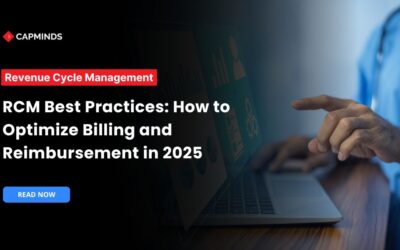How Modern Tech Can Help Manage Your Revenue Cycle
A successful healthcare practice requires efficient revenue cycle management. It helps to improve the financial health of a healthcare organization. However, the manual revenue cycle management process involves the Patient Registration Process, Medical Coding Process, Claims Submission Process, Payment Posting Process, and Denial Management Process.
This process may lead to errors which results in claim denials and loss in revenue. Due to technological development, the healthcare industry is experiencing a major swift change in managing things.
Even in revenue cycle management, many modern technologies are helping the revenue cycle to improve financial outcomes and reduce administrative workload for providers. This blog post shares the health technologies that are helping in managing the revenue cycle.
What is Health Technology?
Health technology is also known as Health IT tools or software solutions that are designed to simplify and streamline the workflow of healthcare providers.
For instance, healthcare providers spend most of their time on administrative tasks. Using health technologies, practitioners can speed up the process, eliminating the need for manual workload. This way, they can focus on what matters the most – delivering quality patient care.
Here is the usage of health technologies:
- Remote patient monitoring for chronic disease management.
- Wearable fitness trackers for activity and sleep.
- Telemedicine for virtual doctor consultations and diagnosis.
- Mobile health apps for medication reminders and tracking.
- Electronic health records for secure data storage.
- AI-assisted medical imaging analysis and diagnosis.
Did you know? The digital health market was valued at $375.99 billion in 2022 and is expected to increase to $452.79 billion in 2023.
By 2030, it is projected to reach $1,965.30 billion, growing at a CAGR of 23.3% from 2023 to 2030.
Benefits of Using Health Technology for Revenue Cycle Management
In revenue cycle management, health technology plays a crucial role. By adopting various health tech solutions, healthcare providers can optimize their medical billing processes, enhance efficiency, and maximize revenue captures.
Here are the benefits of using health tech solutions for revenue cycle management.
- Ensures accurate data entry which reduces claim denials
- Automates repetitive tasks to boost staff productivity
- Provides real-time visibility into financial performance
- Maintains compliance with regulatory requirements, minimizing risks
- Enables data-driven decision-making for process improvement
- Simplifies billing and claims processing workflows
- Enhances revenue capture and collection efficiency
Healthcare organizations can significantly improve operational efficiency by implementing health technologies for revenue cycle management.
This will lead to practice financial performance and overall productivity while providing a better experience for both staff and patients.
Related: All About Prior Authorization Process In RCM
Health Technologies that Help in Managing Revenue Cycle Management
1. Automated Eligibility Verification
Insurance eligibility verification check for patients is the initial process of revenue cycle management. However, it is a recurring task and requires accuracy. Manually verifying all the patients’ insurance eligibility can be daunting, and complex, and may lead to human errors.
However, health tech has a comprehensive solution to streamline this process and also ensures maximum efficiency and accuracy. Automated eligibility verification is a system that helps to verify patients’ insurance coverage in real time before the healthcare services are rendered by the providers.
It ensures reducing the chances of medical billing errors and claim denials associated with insurance coverage. Using this automated eligibility verification system benefits in many ways:
- Automates the insurance eligibility verification process, and frees up time for staff members.
- Accurately align and automatically verify multiple insurance benefits for each patient case.
- Initiate and track authorization requests with automated follow-ups.
2. Cloud-based Electronic Health Records (EHR)
EHR system is the most important health tech solution that significantly benefits not only revenue cycle management but also most healthcare operations.
The Electronic Health Records (EHR) system helps to store and manage patient information. In revenue cycle management, the EHR system holds all the valuable information that is needed for medical billing.
It helps in integrating patient data across different healthcare settings such as:
- Patient demographics and insurance details
- Medical history, past diagnoses, and treatments
- Current clinical data and vital signs
- Physician notes for patient visits
- Orders and prescriptions for diagnostics
- Diagnosis codes (ICD-10) documentation
- Procedure codes (CPT, HCPCS) details
- Charge capture for billable services
- Documentation supporting coding for billing
- Pre-authorization approvals from insurance payers
- Appointment scheduling: dates, times, types
- Visit summaries of patient interactions
And more. Healthcare providers will have access to this comprehensive patient information which helps in documentation and billing patient encounters accurately.
3. Claims Management
Claim denials are one of the most common challenges in revenue cycle management. However, healthcare providers can leverage claims management systems to simplify.
It helps to make the process of handling claims easier.
Using the claim management system, healthcare providers can automate the claims process, which helps to submit claims and get reimbursements quickly. This system ensures:
- Claims are more accurate
- Work flows smoothly
- Fewer manual mistakes
- Follows all regulations
- Getting fast reimbursements
With the ability to track claims and manage denials, this system ensures that healthcare providers are getting reimbursements quickly for the services rendered.
4. Analytics and Reporting
Detailed analytics and reporting are crucial for healthcare practices to continuously monitor and improve revenue cycle management. This tool gives healthcare providers deep insights into their practice’s financial performance and areas of improvement.
Analytics and reporting tools can be seamlessly integrated with the EHR system which helps in:
- Identify bottlenecks and inefficiencies
- Pinpoint areas for improvement
- Track key metrics comprehensively
- Facilitate data-driven decision-making
- Optimize billing and collections
By utilizing these powerful tools, healthcare practices can optimize revenue cycle performance for maximum profitability.
5. E-Billing and Payment Processing
Providing more convenience for patients will improve their satisfaction and experience. Utilizing e-billing and payment processing systems helps streamline the payment collection process while minimizing the manual process.
This technology can be utilized for sending medical bills to patients and allows for online payments electronically. Ensuring speed up the payment collection process.
- Speeds up getting paid
- Reduces medical billing errors
- Quicker payment processing
- Make it easier for patients to pay
- Ensures financial records are accurate
By digitalizing the medical billing and payment process, healthcare organizations can improve cash flow and increase convenience and experience for patients.
6. Patient Engagement Platforms
Patient engagement is vital for better outcomes as well as improving RCM.
Utilizing these platforms, providers can communicate with patients electronically, offering more convenience and transparency. Healthcare providers can:
- Provide online billing options
- Enable secure digital payments
- Send payment reminders electronically
- Offer payment plan flexibility
- Educate patients on costs
Using the patient engagement platforms.
By improving the patient financial experience and making it easier for payments, patient engagement platforms enhance the revenue cycle efficiency and improve convenience.
7. Denial Management Tools
Managing claim denials is an effective strategy for revenue cycle management.
Health technologies have a comprehensive solution – denial management tools that help in proactively identifying the root cause of denials and resolving it.
- Tracks denied claims patterns
- Uncovers root causes automatically
- Refines billing practices systematically
- Reduces manual oversight required
- Improves denial prevention strategies
Leveraging these tools can effectively pinpoint issues behind denials, which allows healthcare providers to address problems and optimize the billing workflow.
8. Medical Coding Software
Maximizing accuracy in medical coding is necessary to properly get reimbursed.
Healthcare providers must properly assign the right medical codes for the services rendered. However, utilizing medical coding software helps the coders to assign the right codes for procedures and diagnoses.
This medical coding software will ensure reducing the risk of human errors and
- Improves coding accuracy
- Increases coder productivity
- Ensures compliance with regulations
- Optimizes reimbursement rates
- Enhances data analytics capabilities
Effective revenue cycle management relies on precise medical coding. Adopting and implementing medical coding software can minimize coding errors to ensure maximizing reimbursements.
Related: 5 Tips To Handle Prior Authorization In RCM
CapMinds Revenue Cycle Management Solution for Your Healthcare Practices Financial Success
Effective revenue cycle management is essential to improve healthcare practices’ financial health.
To avoid the drawbacks, minimize claim denials, and improve your revenue cycle management, an expert must be put into use in your practice.
At CapMinds, we are bringing a comprehensive solution to make your billing and coding experience better. Our medical billing team expedites your entire billing process. Utilizing our Revenue Cycle Management Solution, your healthcare practice benefits from:
- 24/7 Support: Always available for your queries.
- Dedicated Client Manager: Personalized service for your practice.
- Efficiency and Accuracy: Streamlined billing, fewer claim denials.
- Financial Optimization: Maximize revenue, and correct underpayments efficiently.
- Enhanced Cash Flow: Timely collections, and improved financial management.
- Compliance and Security: Adhere to industry standards always.
We optimize your charges, submit your claims, on-time collection, reduce accounts receivables, identify underpayments, and increase your practice’s net collections, thereby better clinical and service expansion.
We also have a dedicated client manager who will be exclusively assigned to you. And the team will be available around the clock to assist with your queries.
“Reach out to CapMinds to make your medical billing process easier and more effective”




